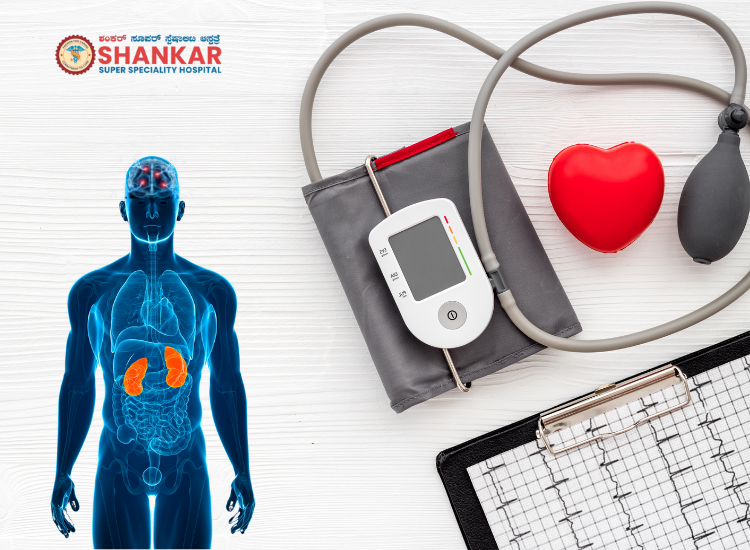

E-Brochure - Download Now!


More than millions of Indians are silently killed by hypertension or high blood pressure. Of the 220 million population of India suffering from hypertension, only 12% have their blood pressure under control. It is an alarming statistic which puts the onus on effective management and awareness. Unchecked high blood pressure does not only cause cardiovascular diseases, but it also causes tremendous damage to the kidneys that it becomes ineffective in cleaning waste and excess fluid and usually leaves chronic kidney disease (CKD).
This blog will help you understand the connection between hypertension and kidney health, discuss the critical link, and empower you to take proactive steps toward managing blood pressure and protecting your kidneys.
The kidneys are bean-shaped organs that sit in the lower back. They filter waste products, toxins, and excess fluids from the blood; they regulate electrolyte balance, produce hormones, and maintain acid-base balance. Blood pressure is a key area of control by the kidneys, as it adjusts fluid levels and release hormones to control fluid distribution and blood pressure. High blood pressure damages the delicate blood vessels found in the kidneys, impairing their filtering ability.
Prolonged hypertension symptoms affecting the kidneys include narrowing of blood vessels, reduced blood flow, and scarring of kidney tissue. Hypertension is both a cause and a consequence of kidney dysfunction. When the capacity of the kidneys is decreased, blood pressure increases even more, damaging the kidneys further. This cycle illustrates why hypertension must be managed to preserve the health of the kidney.
High blood pressure can silently damage kidneys, making early detection crucial. Be aware of these hypertension symptoms related to the kidneys:
Regular health check-ups are vital for detecting kidney damage early, when symptoms may not be apparent. Early detection enables timely intervention to slow disease progression, effective management of hypertension and kidney disease, prevention of complications (e.g., heart disease, stroke), and improved quality of life.
Preventing kidney damage due to hypertension requires a multi-faceted approach. Here are key prevention tips:
The management of hypertension is crucial to maintaining the renal system. If unchecked, unmanaged high blood pressure causes silent destruction to the kidneys, and patients may eventually be diagnosed with chronic kidney disease to further kidney failure, leading to death. However, lifestyle changes adopted while going hand in hand with medication regimens along with monitoring of blood pressure and renal functions reduce the chances of damage to kidneys to a great extent. Prevention of long-term complications resulting from hypertension management and healthy kidneys prevents long-term complications that could otherwise occur. They improve overall well-being and quality of life. Early detection, intervention, and awareness of the warning signs and risk factors are essential.
If you or a loved one is struggling with hypertension, don't wait until it's too late. Consult with our team of expert nephrologists and cardiologists at Shankar Super Specialty Hospital, Bangalore, where leading-edge technology meets compassionate care. We're committed to helping you manage hypertension and safeguard your kidney function. Contact us & we will guide you on the path to a healthier tomorrow.